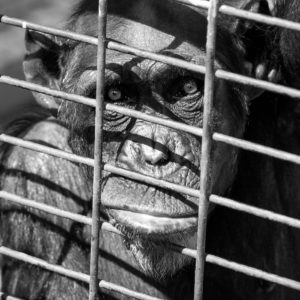There’s a concerted effort afoot by animal experimentation industry trade groups and lobbyists to convince the public that even more money needs to be wasted on painful and pointless tests on animals to bring a COVID-19 vaccine to market. They are crying “monkey shortage”— even as vaccines are in clinical trials.
They need to stop yelling “Fire!” and support good science instead. The public and the Food and Drug Administration (FDA) should not be bamboozled.
Time has already made fools of them.
The two vaccines now in clinical trials are pointing us in a new and better direction. Pfizer, BioNTech and Moderna, the companies responsible for creating the COVID-19 vaccines, did some animal testing, as required by the FDA, but they by-passed what is normally a years-long process of animal studies. That process is nearly always a dead-end.
The companies acknowledged that they knew the virus affects animals differently from humans so there would have been no point to the eight- to ten-year process of administering it to various animal species — a process that fails nearly all of the time to produce a vaccine that is effective in humans.
The reason has become increasingly clear in the last decade: Animals are not miniature humans. Developing a vaccine in monkeys and mice means it works in those species, but rarely in humans.
Animals are complex social beings like humans but they differ genetically and physiologically in important ways. Their immune systems respond differently to pathogens and vaccines. Definitive research shows the SARS CoV-2 virus adapts to and mutates in monkey tissues. In other words, monkeys infected with the virus that causes COVID-19 end up with that virus and another virus that mutated and adapted to monkey cells.
Look at the headlines over the last 40 years — how many times were we assured that an HIV or malaria or TB vaccine that showed promise in monkeys was headed our way? These “monkey-tested” vaccines fail time and time again in humans and in some cases, as happened with a test vaccine against HIV, actually harm patients.
All the animals in the world will not bring vaccines quicker. Experiments on animals are an archaic, crude, and ineffective model for scientific discovery. If the FDA had required the COVID-19 vaccines to go through the usual development and approval route, we would be waiting a decade for a vaccine that likely wouldn’t be effective.
There are better, more reliable research methods that do not involve animals at all.
Significant advances in the fight against COVID-19 are coming through epidemiological studies and in vitro (in the test-tube or culture dish) work using human cells, through integrative modelling and molecular simulations that can assess the different properties of the virus, through 3D printed human tissues, cell-based assays and organs-on-a-chip.
Some researchers are using the world’s most powerful supercomputer to identify existing drugs that could be effective COVID-19 treatments.
The results from these types of research are more accurate and they are directly relevant to humans.
There is no monkey playing the role of human and therefore no extrapolation needed. Importantly, no animals suffer. Collectively, these models are the 21st century solution we need for today’s problems and represent the shortest path to vaccines for COVID-19 and other diseases.
For the sake of both science and compassion, please do not be fooled. The call for more animals is a cynical ploy that plays on justifiable and palpable fear of the virus.
It’s employed to justify nothing but the perpetuation of a dying industry.

